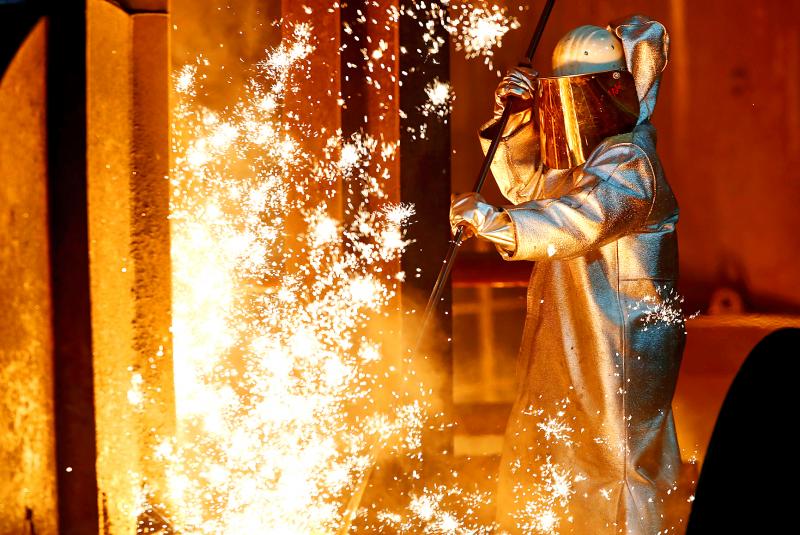ThyssenKrupp AG is to shrink and focus on higher-margin businesses as the COVID-19 pandemic hastens the break-up of one of Germany’s last mega-conglomerates.
The company said it is considering the sale of units that make steel and submarines as it fights for survival.
Once a byword for German engineering prowess, ThyssenKrupp is to be gradually split apart, as chief executive officer Martina Merz aims at reviving the group after the US$19 billion sale of its elevator unit closes later this year.

Photo: Reuters
‘DIFFICULT DECISIONS’
“We have taken some difficult decisions that were long overdue,” Merz said in a statement on Monday. “ThyssenKrupp will emerge smaller but stronger from the transformation.”
The steel unit, the traditional heart and soul of the company, burned through more than 1 billion euros (US$1.09 billion) in cash in the six months ending March 31. It has struggled for years against cheaper competition from Asia.
ThyssenKrupp’s European steel business had sales of 4.37 billion euros in the six months through March, while its Marine Systems unit had sales of 235 million euros over the same period.
The company said a cluster of loss-making businesses, including its plant technology unit that constructs factories, would also be dropped from its portfolio, with outright closures of heavy plate steel and battery solutions divisions an option.
It will look to develop its raw materials distribution and its components units.
ThyssenKrupp’s rising debt underscores the shrinking room for maneuver. The company’s net debt stands at 7.55 billion euros, according to earnings figures released last week, a figure likely to rise as the fallout from the pandemic cripples the global economy.
ThyssenKrupp already held exploratory steel talks with Salzgitter AG, people familiar with the matter said last year.
Chinese and Indian peers had also expressed interest in ThyssenKrupp’s European steel operations, the people said.
Sweden’s SSAB AB is also among the potential partners, one of the people said.
While the European Commission blocked a planned merger of ThyssenKrupp Steel with Tata Europe last year, both companies could revisit a deal and potentially sell or close steel plants to allay antitrust concerns, some of the people said.
MERGER?
ThyssenKrupp said it was in intensive discussions over a merger of the Marine Systems business, which builds submarines and other military ships, with a combination with a national or European competitor an option. The unit has run into project overruns in recent years.
“We have left no stone unturned in very carefully examining the individual development potential of each business for ThyssenKrupp,” Merz said. “The sale of the elevator business gives us the capacity for action.”

Intel Corp chief executive officer Lip-Bu Tan (陳立武) is expected to meet with Taiwanese suppliers next month in conjunction with the opening of the Computex Taipei trade show, supply chain sources said on Monday. The visit, the first for Tan to Taiwan since assuming his new post last month, would be aimed at enhancing Intel’s ties with suppliers in Taiwan as he attempts to help turn around the struggling US chipmaker, the sources said. Tan is to hold a banquet to celebrate Intel’s 40-year presence in Taiwan before Computex opens on May 20 and invite dozens of Taiwanese suppliers to exchange views

Application-specific integrated circuit designer Faraday Technology Corp (智原) yesterday said that although revenue this quarter would decline 30 percent from last quarter, it retained its full-year forecast of revenue growth of 100 percent. The company attributed the quarterly drop to a slowdown in customers’ production of chips using Faraday’s advanced packaging technology. The company is still confident about its revenue growth this year, given its strong “design-win” — or the projects it won to help customers design their chips, Faraday president Steve Wang (王國雍) told an online earnings conference. “The design-win this year is better than we expected. We believe we will win

Chizuko Kimura has become the first female sushi chef in the world to win a Michelin star, fulfilling a promise she made to her dying husband to continue his legacy. The 54-year-old Japanese chef regained the Michelin star her late husband, Shunei Kimura, won three years ago for their Sushi Shunei restaurant in Paris. For Shunei Kimura, the star was a dream come true. However, the joy was short-lived. He died from cancer just three months later in June 2022. He was 65. The following year, the restaurant in the heart of Montmartre lost its star rating. Chizuko Kimura insisted that the new star is still down

While China’s leaders use their economic and political might to fight US President Donald Trump’s trade war “to the end,” its army of social media soldiers are embarking on a more humorous campaign online. Trump’s tariff blitz has seen Washington and Beijing impose eye-watering duties on imports from the other, fanning a standoff between the economic superpowers that has sparked global recession fears and sent markets into a tailspin. Trump says his policy is a response to years of being “ripped off” by other countries and aims to bring manufacturing to the US, forcing companies to employ US workers. However, China’s online warriors